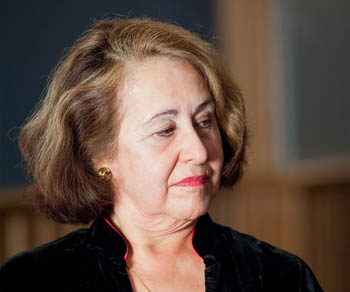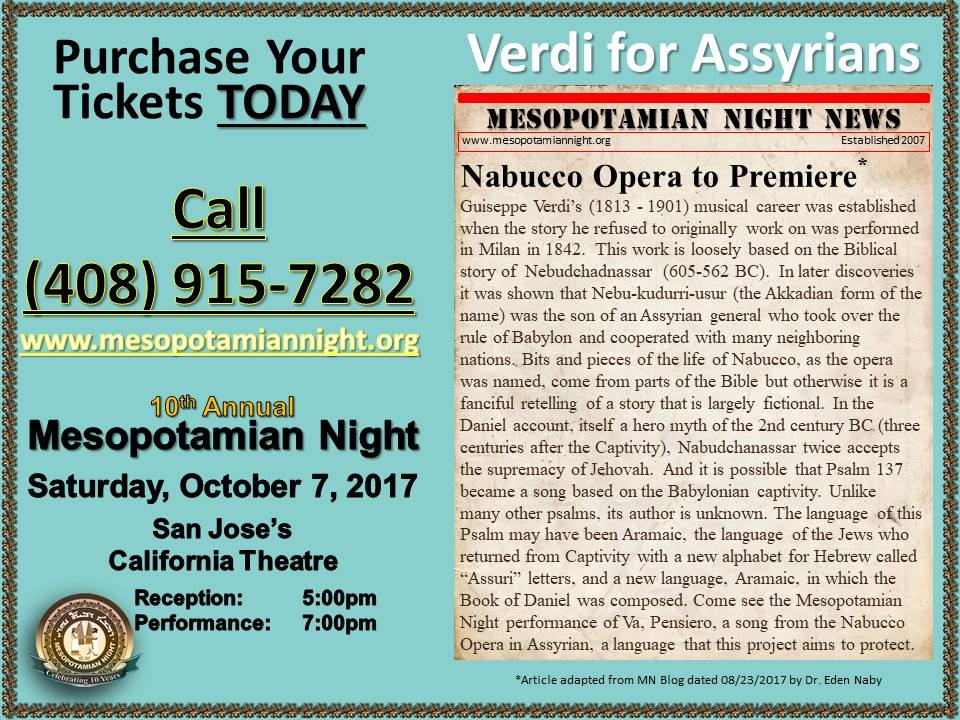
Dr. Eden Naby and her late husband professor Richard Frye have been a supporter and sponsor of the Mesopotamian Night project since its inception in 2007. She has contributed over $100,000 in the past ten years toward our project. She has also helped us with research, articles, and content creation. In the article below, she gives us some insight about the Nabucco Opera and the Chorus of Hebrew slaves which will be premiered in Mesopotamian Night 2017 in San Jose, California.
Of the 150 Psalms found in the Old Testament of the Bible, after the 23rd and 24th, perhaps the most recited in Jewish and certain Christian services, is the 137th Psalm. In Nabucco, Verdi’s first highly successful opera, this psalm forms the basis of the most famous Verdi choral work.
In 1840 Milan, Guiseppe Verdi (1813 – 1901) had lost his wife and two children to illness, and his musical career did not show great promise. When offered the libretto to a work based loosely on the Biblical Nebudchadnassar (605-562 BC) story, he refused the commission at first. But when the opera was performed in Milan in 1842, it established his career and he went on to become a prolific operatic composer.
But why did this very pro-Jewish libretto make such a mark on the operatic repertoire? Apparently none of those involved in its creation were of Jewish descent. The answer, briefly, lies in the changing Europe of Verdi’s day when 1) nationalism (Italian for example) trumped religious biases, 2) fascination with proving the veracity of the Bible led to a popularity of biblical themes, 3) the beginnings of archeological fascination first with Egypt, then Mesopotamia, led to discoveries of the rich legacy of ancient history.
Nebu-kudurri-usur (the Akkadian form of the name) emerges in three Old Testament books: Book of Kings, Jeremiah, and Daniel. Later discoveries show that he was the son of an Assyrian general who took over the rule of Babylon, cooperated with the Persians and Medes under Cyrus, and conquered many parts of the eastern Mediterranean, including Judah. The destruction of the Temple of Solomon (567) took place as part of the military sweep westward toward Egypt. The carrying away of the Hebrews dates from this period.
Bits and pieces of the life of Nabucco, as the opera was named, come from parts of the Bible but otherwise it is a fanciful retelling of a story that is largely fictional. In the Daniel account, itself a hero myth of the 2nd century BC, three centuries after the Captivity), Nabudchanassar twice accepts the supremacy of Jehovah. And it is possible that Psalm 137 became a song based on the Babylonian captivity. Unlike many other psalms, its author is unknown. The language of this Psalm may have been Aramaic, the language of the Jews who returned from Captivity with a new alphabet for Hebrew called “Assuri” letters, and a new language, Aramaic, in which the Book of Daniel was composed. Shall this language die?
To compare the Psalm with the Verdi opera chorus, below is the text of the two:
| Psalm 137 (KJV)
By the rivers of Babylon, there we sat down, yea, we wept, when we remembered Zion. 2 We hanged our harps upon the willows in the midst thereof. 3 For there they that carried us away captive required of us a song; and they that wasted us required of us mirth, saying, Sing us one of the songs of Zion. 4 How shall we sing the Lord’s song in a strange land? 5 If I forget thee, O Jerusalem, let my right hand forget her cunning. 6 If I do not remember thee, let my tongue cleave to the roof of my mouth; if I prefer not Jerusalem above my chief joy. 7 Remember, O Lord, the children of Edom in the day of Jerusalem; who said, Rase it, rase it, even to the foundation thereof. 8 O daughter of Babylon, who art to be destroyed; happy shall he be, that rewardeth thee as thou hast served us. 9 Happy shall he be, that taketh and dasheth thy little ones against the stones. |
Va penserio from Nabucco
Go, thought, on wings of gold; go settle upon the slopes and the hills, where, soft and mild, the sweet airs of our native land smell fragrant! Greet the banks of the Jordan and Zion’s toppled towers… Oh, my country, so beautiful and lost! Oh, remembrance, so dear and so fatal! Golden harp of the prophetic seers, why dost thou hang mute upon the willow? Rekindle our bosom’s memories, and speak to us of times gone by! Oh you akin to the fate of Jerusalem, give forth a sound of crude lamentation, oh may the Lord inspire you a harmony of voices which may instill virtue to suffering. |

